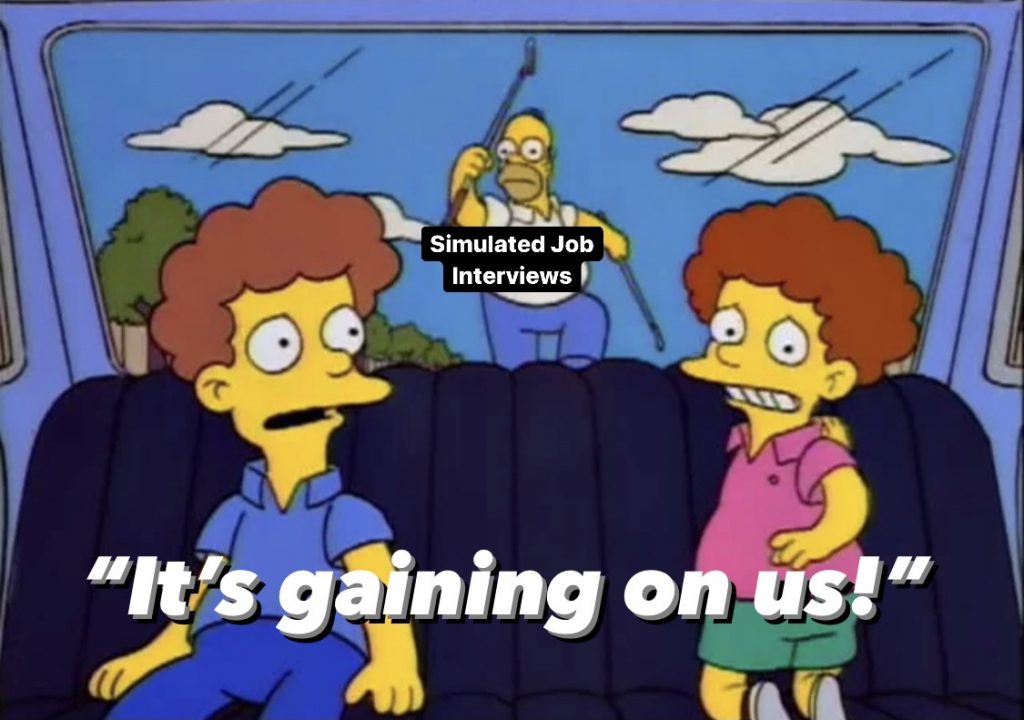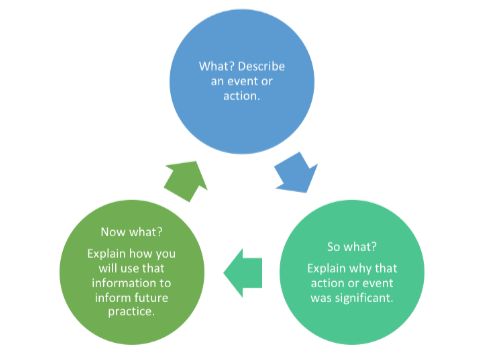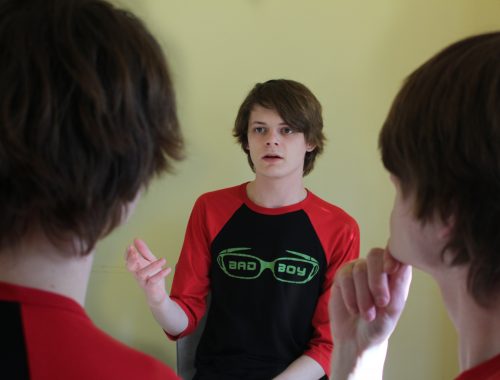Sounds Negative But I’ll Take It As A Positive

Ok, so I have finally come to terms with the fact that I may need professional help sooner rather than later for my interview skills. And that’s ok. I have struggled to put myself in the spotlight for as long as I can remember. I would even try my best to avoid it a lot of the time. Nothing beats the void of that sweet sweet comfort zone.
But deep down I knew this particular trait was something I loathed deeply. It’s especially frustrating because I can be the life and soul of the party when I want to be. However, in terms of formal situations, I gain a tendency to implode. Perhaps I’m being a little harsh on myself but that was always my mindset.
In short: I lack confidence.

Semester 2 came rather quickly. I was one week into my work placement with Big Telly (Not exactly what I had envisioned but I’ll cover that in my next blog). A slight sense of dread overcame me when I realised that the simulated job interviews were rapidly approaching. I say ”slight” due to the fact that there was nothing at stake for these interviews and the interviewees were my fellow colleagues. So what was there to worry about? Well, I guess I just didn’t want my colleagues to pick up on my certain flaws: Awkward body language, poor eye contact and stumbling over every word that comes out of my mouth. I speak of these flaws from past experiences and although it was an informal interview, such thoughts would always linger regardless. Essentially I didn’t want to make a fool of myself.

So over the course of 3 days, I scoured a number of job websites trying to find something suitable for my experience in music production. Mind you this can be a tricky endeavour as many music-related job opportunities tend to be through word of mouth and mutual connections. Eventually, however, I found a job opening that would tick most of the boxes in relation to my field. The job was a sound designer for a charity organisation based in London called Humanitarian Operations (HOPE). For a week I wrote down and memorised my relevant experience in relation to the job role. (Quite a substantial amount of experience which surprised me). Now all I had to do was prepare properly. All the correct information is there in my head but how do I construct it into a legible and coherent sentence? Sometimes when I’m asked a question all that information gets enveloped into a dense mist inside my noggin with nowhere to escape. That has always been my worst fear.
And just like that, the day had arrived. To describe my overall experience on the day, I will again be referring to Borton’s Reflective Model. I feel this is a suitable model to assess my challenges, their significance and how I can overcome them.

What?
So I was a little less nervous than usual going into this mock interview. My fellow colleagues and I were very reassuring to each other in the days prior. When we congregated in our group that morning the atmosphere was rather casual. We along with other groups in the same room chatted amongst ourselves. It was quite informal to say the least. That very much put me at ease during my final preparations. A little bit too much ease perhaps? Given the initial relaxed atmosphere we tried to act as formally as possible once the interviews commenced. I.e asking relevant questions to specific job roles and assessing each other in terms of body language, eye contact and content of answers. Dare I even say that I enjoyed being the interviewer.

But then it got to my turn to be the interviewee. During my five minute preparation I was relatively confident albeit with a hint of nerves. Normal I guess. ”Next interviewees please!”. I went in to my group and sat down as if I have never met them before. Suddenly they were different people. ”So tell us about yourself Brian.” I came prepared for this question and answered it relatively confidently. But then came the other questions.
So What?
Very quickly my demeanour changed. The dreaded dense mist came and so I lost my chain of thought. I knew the information was all there but I found it very difficult to formulate my answers. Even when I did answer certain questions some of my answers had no relation to the question that was asked. Worst part of all was that I was completely aware of this at the time. This made me even more nervous. It was almost as if I could see myself being awkward. This particular scenario was significant to me because everything that I had feared would go wrong ultimately went wrong.
“Don’t let the question floor you even if it really bothers you – don’t let the interviewer see that you are easily rattled.”
(Lees, 2012)
That quote very much sums up my interview. I let each question floor me and thus my colleagues could see that I was easily rattled. However upon reviewing feedback from my fellow peers it would suggest that I didn’t perform as badly as I thought. Or maybe they were being a bit generous? Perhaps I am being overly harsh on myself again.
Now What?
This summary of my experience would suggest that I my confidence has taken a direct hit. This is not the case however. In fact I am genuinely happy that this experience went pear shaped. The reason being is because I can now precisely identify where I went wrong and how I can address these problems in future. My peer review feedback forms are very helpful in this regard.
Furthermore in previous years I would have laughed at the consideration of seeking extra curricular help for my interview skills. Now that I am a little bit older and wiser however I’m greatly considering it.
Overall the simulated interviews have given me greater confidence to focus on areas of my skillset that are challenging. In previous years I would have neglected these challenges. However after receiving feedback from my colleagues I have now gained a greater sense of clarity as to why interviews are my biggest challenge.
It is now up to me to become my own personal detective.
Bibliography:
Bda.uk.com. 2021. [online] Available at: <https://www.bda.uk.com/uploads/assets/071c9b28-7e02-4559-b14130f4745006df/cpdreflecttool.pdf> [Accessed 22 November 2021].
Lees, J., 2012. Job Interviews: Top Answers to Tough Questions. 3rd ed. Berkshire: McGraw Hill – Publishing Company, p.204.
Mock Interviews
The Simulated Interview
You May Also Like

Shocker, Tom also sucks at interviews!
18 February 2022
So You Want To Be A Teacher?
17 February 2022
